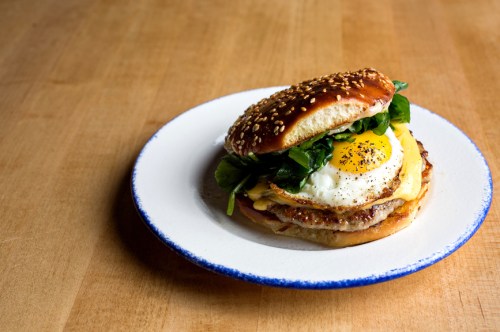If You Aren’t Front-Loading Your Day with a Hearty Breakfast, Dietitians Encourage Trying It—Here’s Why and How
Two registered dietitians share the health benefits of front-loading breakfast, i.e. starting your day with a hearty, healthy morning meal.

If breakfast isn’t a priority, we hear you. Between busy schedules, taking care of kids, the toxic pull of diet culture, and just flat-out not having much of an appetite, you might not always have the time or desire to eat a solid meal in the morning.
Experts in This Article
registered dietitian nutritionist, recipe developer, and author based in Atlanta, Georgia.
At the same time, however, dietitians recommend front-loading your day with a hearty meal, at least when and to the extent you can. (To clarify, “front-loading” in this context = eating a significant breakfast.) Elaina Efird, RD, a registered dietitian and eating disorder specialist, lists it as one of the best nutrition changes you can make, explaining that her clients have reported meaningful changes in terms of hunger, energy levels, and sleep.
In addition to the benefits Efird mentions, eating a full breakfast can also be your friend if you work long hours (and/or don’t have set meal periods) or deal with certain health conditions. “For those with certain health conditions, like diabetes, GERD, or chronic acid reflux, eating a balanced breakfast composed of carbohydrates, fats, and protein can help stabilize blood sugars, help with morning nausea by keeping acid at bay, and keep you fueled and energized throughout the day,” says Supriya Lal, RD, MPH, a dietitian in New York City.
An easy guide to front-loading breakfast
Does the idea of planning multiple breakfasts that fit the three main categories—carb, fat, and protein—overwhelm you? If so, that’s okay! Lal breaks it down into concrete examples you can choose from. Front-loading doesn’t have to be a stressful, time-consuming endeavor. Her ideas include:
- Oatmeal with nuts or peanut butter
- Greek yogurt with fruit, nuts, and granola
- A smoothie with a nut butter or protein powder, fruit, and vegetables
- Eggs with a whole wheat English muffin and avocado
What if you aren’t hungry in the mornings?
If you don’t wake up hungry with a grumbling stomach, Lal says that’s normal, too. She suggests starting with a smaller portion and working your way up, while checking your body’s comfort level. Another option is finding a granola bar or smoothie that isn’t super big volume-wise but is high in protein, she shares.
This isn’t about force-feeding yourself; it’s about giving your body nutrients and energy, as well as not ignoring hunger cues (or trying to replace them with caffeine, diet foods, and so on). “Make sure you’re not skipping breakfast out of habit or drinking water or coffee to suppress your appetite, for example,” says Marisa Moore, MBA, RDN, LD, a culinary registered dietitian.
Keep in mind that you may find yourself wanting breakfast on the earlier or later end of the morning, and that’s okay, too. Some people are hungry right when they wake up, and others may not be hungry until they get to work or a little after. “The key is to make sure you get the nutrients you need throughout the day, even if you start eating after traditional breakfast time,” Moore says.
Don’t forget to listen to your body throughout
As mentioned above, the importance of listening to your body cannot be understated (and if you need a hack, this food journal template makes it easier). Your body knows what it needs! For example, you may want to tack something extra to one of the breakfast ideas above, or you may prefer peanut butter to eggs, and so forth. All good.
Your meals and hunger level may also depend on what your day looks like (and therefore may change). “There is no one-size-fits-all diet,” Moore says. “If you are more active early in the day, you’ll need more food early in the day. And getting the right amount of balance of nutrients can help fuel a busy start to the day.”
All of this is just generally FYI, though. While dietitians have expert knowledge and helpful suggestions, they know every person is different. “As a registered dietitian, my whole shtick with clients and patients is customizing plans or recommendations to their individualized needs,” Lal says. “No two people are exactly alike, and suggestions should reflect that. As such, I always encourage people to listen to their own bodily cues and do what is right for them.”
Sign Up for Our Daily Newsletter
Get all the latest in wellness, trends, food, fitness, beauty, and more delivered right to your inbox.
Got it, you've been added to our email list.










